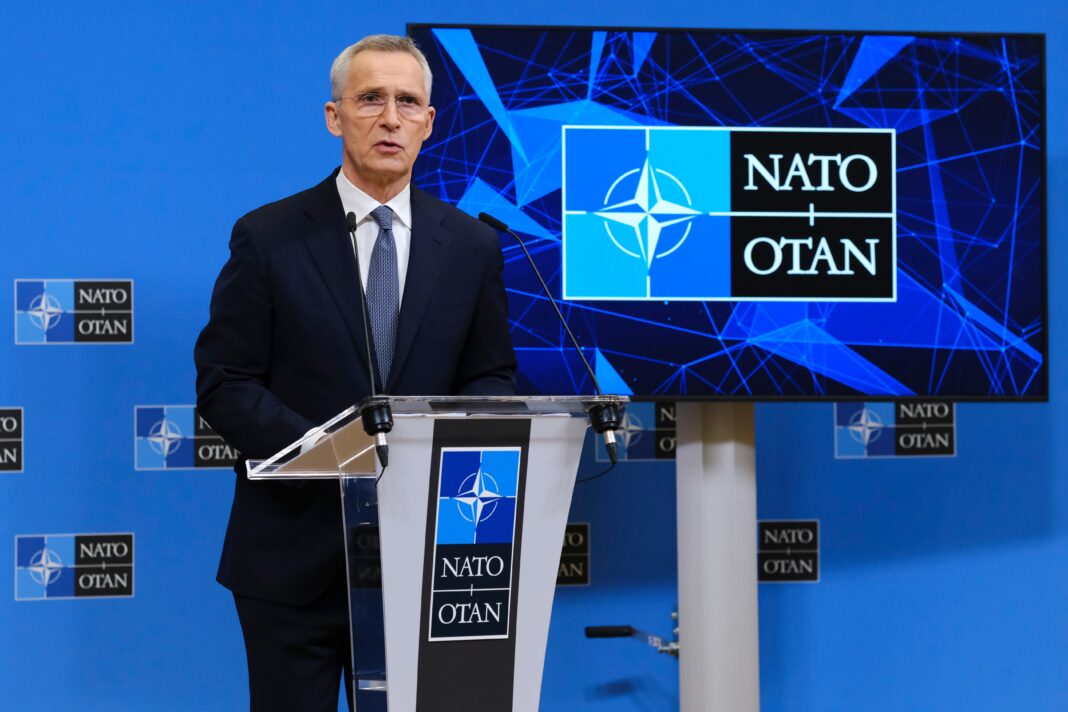by Raffaele Crocco
The matter is one: NATO countries are moving at two speeds. The problem is that one of these two speeds, the apparently faster one, the running one, leads to only one result: war with Russia, while the second, the slower one, shows the structural and proven frailty of the Alliance, which needs a counterpart to exist and which must exist anyway to guarantee the power and role of the United States.
In short, a controversial NATO conference is taking place these days in Vilnius, Latvia. The war in Ukraine, with the overbearing reappearance of the enemy Russia, has breathed new life into the Atlantic Alliance, which has been searching for a role for thirty years since the collapse of the Soviet Union. The Alliance’s limitations lie in its political structure, its underlying idea of defending territory against attack. It is not – it should not be, it must be said, given the precedents – an offensive and interventionist alliance. The treaty is clear and no country has tried to change it in these thirty years.
This insurmountable barrier is now forcing NATO to keep Ukraine out of the alliance. Kyiv’s entry, in the name of the principle of “defending every inch of an Alliance country’s territory”, would mean an immediate war in response to Russia’s invasion in February 2022. A folly none of the historical countries want, but which the Eastern European and Baltic countries, the Alliance’s latest acquisitions, seem to welcome and desire. That is why Biden, the majority partner, reminded us that Ukraine’s entry into NATO is not yet on the table. The support for Kyiv – useful to flatten Russia – will not diminish, on the contrary: Washington has even gone so far as to put cluster bombs, banned by international treaties, on the table. But the steps towards Alliance membership concern a not-too-near future. It is a firm and wise decision that, for the time being, cools the bellicose folly of the countries that have joined the Alliance in recent decades.
These are the same countries – strangely enough – that have set the world back three decades. Their membership of NATO has given Moscow a growing sense of isolation and encirclement. A feeling that – if we strip away ideologies, prejudices and jubilation – has a logic. Russia has been a continental power for at least four centuries. It has inevitably experienced the territory around its borders as a ‘security zone’ in relation to Europe. The slow erosion of this territory, with states joining the alliance led by rival USA, has led the Russian ruling class to react. Wrong? Certainly, if we imagine a world without ‘dominant powers’ and work towards effective international cooperation at all levels. Absurd? No, if we see the world as it is and read it with the eyes of reality. How would the United States react if Moscow formed a ‘purely defensive alliance’ with the countries of the American isthmus? Nicaragua, El Salvador, Honduras and further down, Colombia and Venezuela? Do we really think that they would accept this situation, this encirclement? Certainly not, and we have witnessed this in recent years when Chávez’s Venezuela tried to tie itself to Moscow.
Great powers do not accept rival enlargements, and to have ignored this rule for three decades is a sign of stupidity. Not to have built a common system of relations and security in Europe, capable of guaranteeing everyone’s sovereignty and political equilibrium, was a folly for which we risk paying dearly. Succumbing to Germany’s mercantile ambitions and its desire for eastward expansion, to the politico-military blackmail of the Visegrad Group (Poland, Hungary, the Czech Republic and Slovakia) and to the United States’ thirst for world power, NATO has resisted the wear and tear of time and its own uselessness by transforming itself into an instrument of the private interests of each state. All this without its members having the strength or the will to make it disappear for obvious lack of purpose or to re-found it on a different basis.
So Vilnius is a summit of countries so far apart they couldn’t find a new secretary-general: Norwegian Jens Stoltemberg got a one-year extension to fill the gap. A meeting before which an arrogant middle power like Turkey, held everyone hostage, blocking the membership of Sweden, which is guilty of not handing over to Ankara the Kurdish fighters on its territory. In the last few hours this has been lifted, probably in exchange for the delivery of new F16s, which Turkish President Erdogan will use to bomb the Kurds in Syria. A meeting that will be the umpteenth opportunity for bellicose propaganda, with threats, promises and muscle flexing, without the slightest attempt to find a diplomatic and just solution to this war that is destroying a country, killing thousands of people and running the risk of becoming like all wars: endless and pointless.
On the cover photo: NATO Secretary General Jens Stoltenberg © Alexandros Michailidis/Shutterstock.com
























